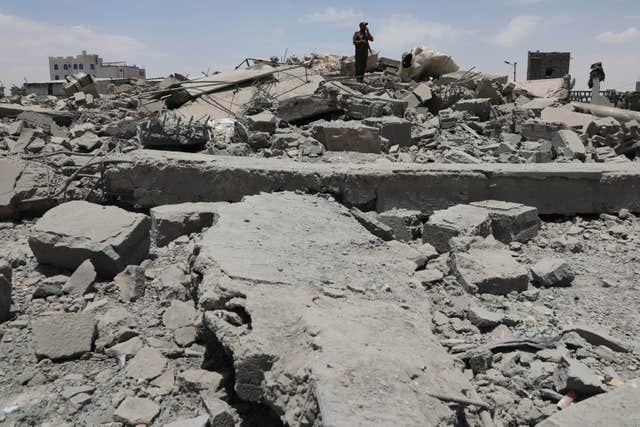Rebels say eight people killed as US acknowledges more than 800 airstrikes
US Central Command said its Operation Roughrider had ‘killed hundreds of Houthi fighters and numerous Houthi leaders’ in Yemen.

US airstrikes targeting Yemen’s capital killed at least eight people overnight, Houthi rebels said, as the American military acknowledged carrying out more than 800 individual strikes in their month-long campaign.
The rebels also alleged a US airstrike hit a prison holding African migrants.
The overnight statement from the US military’s Central Command also said its Operation Roughrider targeting the rebels had “killed hundreds of Houthi fighters and numerous Houthi leaders”, including those associated with its missile and drone program. It did not identify any of those officials.
Central Command did not comment on the claims about the prison, and casualty figures were not clear. Graphic footage aired by the Houthi’s al-Masirah satellite news channel showed what appeared to be dead bodies and others wounded from an explosion at the site.

The US insisted it would continue to carry out its airstrikes, which began on March 15 under President Donald Trump as he seeks a deal with Iran over its rapidly advancing nuclear programme.
“Iran undoubtedly continues to provide support to the Houthis,” the statement said.
“The Houthis can only continue to attack our forces with the backing of the Iranian regime.
“We will continue to ratchet up the pressure until the objective is met, which remains the restoration of freedom of navigation and American deterrence in the region.”
The US is targeting the Houthis because of the group’s attacks on shipping in the Red Sea, a crucial global trade route, and on Israel.
The Houthis are also the last militant group in Iran’s self-described Axis of Resistance capable of regularly attacking Israel.
Early on Monday, the Houthis aired footage of what it described as a US strike targeting the Bani Al Harith District north of Yemen’s rebel-held capital Sanaa. Blood stains could be seen among the rubble and a damaged truck.
The al-Masirah channel reported that eight people were killed in the strike, something not immediately acknowledged by Health Ministry officials.
Strikes also hit Yemen’s Amran and Saada governorates during the night with two others killed on Sunday, the Houthis said.
“To preserve operational security, we have intentionally limited disclosing details of our ongoing or future operations,” Central Command said on Monday. “We are very deliberate in our operational approach, but will not reveal specifics about what we’ve done or what we will do.”
The military has not acknowledged strikes killing civilians — something activists warn likely has happened in the intense campaign.
The US is conducting strikes from its two aircraft carriers in the region — the USS Harry S Truman in the Red Sea and the USS Carl Vinson in the Arabian Sea.
On April 18, an American strike on the Ras Isa fuel port killed at least 74 people and wounded 171 others in the deadliest-known attack of the American campaign.
Central Command on Monday offered an explanation for why it hit the port.
“US strikes destroyed the ability of Ras Isa Port to accept fuel which will begin to impact Houthi ability to not only conduct operations, but also to generate millions of dollars in revenue for their terror activities,” it said.
The Houthis have increasingly sought to control the flow of information from the territory it holds to the outside world. It issued a notice on Sunday that all those holding Starlink satellite internet receivers should “quickly hand over” the devices to authorities.
Starlink terminals have been crucial for Ukraine in fighting Russia’s full-scale invasion, and receivers also have been smuggled into Iran amid unrest there.





